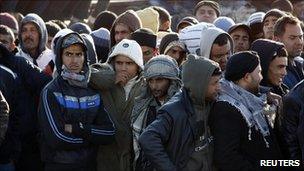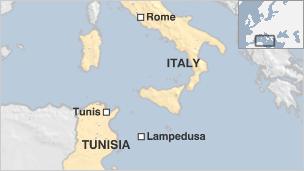Italy 'to deploy police to Tunisia' to tackle migration
- Published
Many migrants have headed to the Italian island of Lampedusa
The Italian government is to ask for permission to deploy its police in Tunisia, to tackle a sudden wave of immigration, say officials.
Interior Minister Roberto Maroni said Europe was not doing anything to help stop the flow of migrants, the Italian news agency Ansa reports.
More than 4,000 migrants are reported to have arrived on the island of Lampedusa in the past few days.
Italy has declared a humanitarian emergency and called for EU assistance.
Mr Maroni, who is a member of the anti-immigration Northern League party, said the Tunisian system was "collapsing".
"I will ask the Tunisian foreign ministry for permission for our authorities to intervene to stop the flow in Tunisia," Ansa quoted him as saying.

The migrants are experiencing political upheaval and poverty in Tunisia
Mr Maroni accused other EU states of leaving Italy to deal with the situation alone, despite the impact it could have on other countries.
"Europe is not doing anything, I am very concerned," he said.
"I asked for the urgent intervention of the EU because the Maghreb is exploding. There is an institutional and political earthquake that could have a devastating impact on the whole of Europe through Italy.
'Out of control'
Italian officials said another 1,000 migrants arrived on Lampedusa on Sunday, bringing the total to more than 4,000 and swamping facilities there.
The small Sicilian island, which normally has a population of about 5,000 people, is closer to North Africa than the Italian mainland.
Most of the migrants have come from Tunisia, which has seen continued turmoil since the 14 January overthrow of President Zine al-Abidine Ben Ali.

They have arrived in small and overcrowded boats - Tunisia's official Tap news agency says one man died and another is missing after one boat sank while still in Tunisian waters.
The mayor of Lampedusa, Bernardino De Rubeis, told reporters on Sunday: "It's out of control."
On Friday, Mr Maroni and Foreign Minister Franco Frattini requested an immediate deployment of the EU's border security agency, Frontex, to patrol off the Tunisian coast.
Mr Maroni has said terrorists and al-Qaeda supporters, as well as common criminals, could be using the situation to enter Europe.
Ferries and planes have been pressed into service to transport the migrants to detention centres in Sicily and elsewhere in southern Italy so their identities can be checked.
The UN's refugee agency says some of the migrants are seeking asylum from the political upheaval in Tunisia while others are fleeing poverty.
- Published12 February 2011
- Published12 January 2011
- Published4 January 2011
- Published10 December 2010
- Published1 December 2010